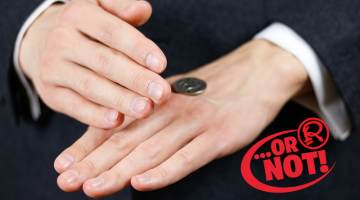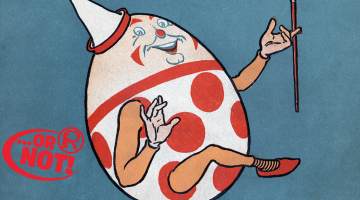Turn on the news and, no matter what part of the country you’re in, you’ve got a pretty good chance of hearing, “A Florida Man…” followed by something absolutely absurd—like the Gainesville man who used a three-foot alligator as a weapon or the mermaid that was banned from a pool for violating the “no fins” policy.
To be fair, Florida has been historically offbeat. The state’s first flag displayed the text “Let Us Alone,” and at one point it was pretty lonely.
In 1940, Florida was the least populated state in the South. Today, it is one of the most populated in the country—beating out New York for third place behind California and Texas. With over 21 million residents, plus the hundreds of millions of visitors a year, the state is set up for the strange!
But, let’s take it back to 1940, when Robert Ripley brought his Believe It or Not! CBS radio show, See America First, to Florida.

Marineland, the world’s first “oceanarium,” had opened two years earlier in St. Augustine and quickly became one of Florida’s most popular tourist destinations. Ripley’s crew arrived with plans to broadcast part of the show underwater—a historical first. His Marineland visit started with a dolphin interaction—feeding them and then helping milk a female dolphin. This dolphin was lifted from the water in a webbed harness, but in order for Ripley to get the right angle, a Marineland attendant had to cut a harness strap. In doing so, the dolphin was accidentally grazed and a spurt of blood splattered onto Ripley’s diving suit.
Next, Ripley put on a huge diving helmet, which fit over the headphones and microphone that would allow him to broadcast from the shark pool. Burdened by the cumbersome suit and helmet, Ripley and a Marineland expert slowly descended to the bottom of the pool. Ripley had grumbled about this stunt all day. He was not a good swimmer and was anxious about speaking on the air without a script.

Submerged, Ripley was equipped with a long stick to feed the sharks mullet. For some reason, the sharks weren’t interested. They began circling Ripley and one shark bumped him backward. The diver grabbed Ripley’s arm and dragged him to the stairs, where he was pulled from the water. The diver figured the sharks must have picked up the scent of dolphin blood on Ripley’s suit. The experience may have frightened and infuriated Ripley, but the show was a thrilling hit.
Ready for more Florida and fame, his shark encounter did little to dampen Ripley’s intrepidness. When he heard about a snake and alligator farm at Silver Springs, he notified his New York office to change the broadcast schedule. He wanted to milk a rattlesnake on the air.
Ripley began his broadcast on a boat with Ross Allen, founder of the Silver Springs Reptile Institute. “Don’t be frightened by that noise you hear in the background,” Ripley told listeners. “It is just the bellowing of the alligators, who are all excited by this broadcast from their homeland!” He then described how, moments earlier, Allen had jumped into the water to wrestle a ten-foot alligator.

Once on land, Allen and Ripley climbed down a ladder into a pit slithering with five hundred poisonous snakes. The plan was for Allen to grab a rattlesnake and show Ripley how to “milk” it and collect its venom. Ripley wore thick rubber boots, while Allen remained barefoot. “Nervous, Bob?” Allen asked. According to the script, Ripley was supposed to say that after man-eating sharks and deadly snakes, “These Believe It or Not programs will be the end of me yet.” He didn’t get the chance.
Just as he and Ross lowered themselves into the pit, the lights went out. Allen yelled, “Let’s get the hell out of here!” his words barely audible over the air. He and Ripley fumbled their way out of the pit, and Ripley managed to ad-lib enough to turn the show over to the New York studio.
Needless to say, after these two very Florida broadcasts, Ripley retreated back to his New York home. But it wouldn’t be the last time he explored Florida…
Ripley’s prized possession was a ship called the Mon Lei, built in 1939. One story says it was sailed across to California, to keep it out of Japanese hands, and was later found sunk in the mud in Florida. He invested $40,000 to restore the worn-out vessel and, in April of 1946, set sail towards the Sunshine State.
A Miami newsman described the Mon Lei as “something between an Orange Bowl float and an opium dream.” Ripley continued to sail up Florida’s west coast to St. Petersburg, where he signed autographs at the pier for hours. But he had signed something else on aboard the Mon Lei in St. Pete—his Last Will and Testament. After signing the document, he hid it aboard the Mon Lei, hoping its services wouldn’t be required for years to come.

A couple of years later, Ripley made Florida a permanent home for himself and the Mon Lei with a Spanish-style mansion called Hi-Mount in Palm Beach. Far from the demanding New York lifestyle, Florida seemed to relax Ripley, but within weeks of moving into his new home, he was back in New York.
Regardless of his indecisiveness, Florida was still set to be Ripley’s final destination.
Located at 9 San Marco Avenue, Ripley’s St. Augustine Odditorium was once known as The Warden Castle. These four stories of Moorish Revival architecture were built in the 1880s and hosted many notable guests, from Rockefeller and Flagler to Marjorie Rawlings, author of The Yearling, who actually purchased the castle with her husband.
Robert Ripley was enamored with Warden and tried time after time to purchase it himself but was continuously denied. It wasn’t until after Ripley’s sudden death in 1949 that his estate was able to acquire the property, making it the first permanent Ripley’s Believe It or Not! Attraction.

Now, with four Believe It or Not! Attractions in the state, there is no shortage of strange in Florida.









Comment Your Reaction